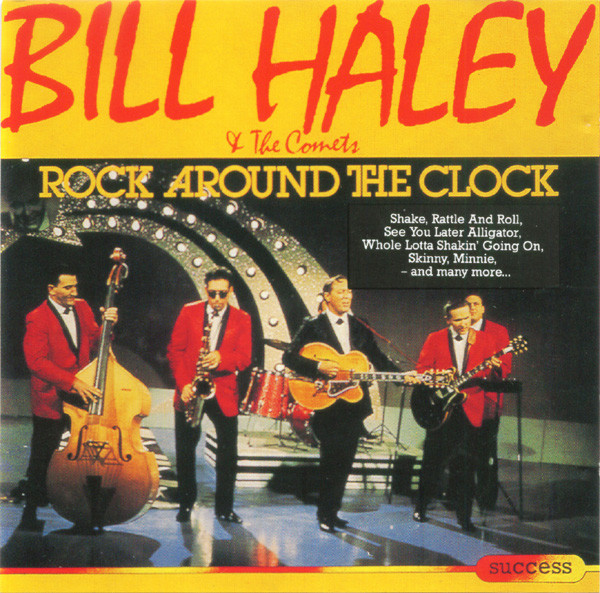

In fact, he told Canadian dee-jay Red Robinson that he was an Indiana state yodeling champion, although no one has ever been able to confirm (or deny) that claim. He wore the hat, sang the songs of an idealized west, and yodeled. He was very much in the thrall of pre-War faux cowboy music. Bill Jr.'s desire to play music was inhibited only by the shyness that probably stemmed from self consciousness over his one blind eye.īefore the end of the Second World War, though, Bill Haley was trying to carve out a career in music.

He played the banjo and Maude played light classics on the piano. moved the family to Boothwyn, Pennsylvania during the Depression and kept his head above water by working in the shipyards. His father, Bill Sr., was a transplanted Kentuckian and his mother, Maude, was British. Briefly, William John Clifton Haley was born on Jin the Detroit suburb of Highland Park. Included with our definitive collection of early Bill Haley, 'The Real Birth Of Rock 'n' Roll' (BCD 16509).
Bill hayley and the comets rock around the clock full#
The full story of Bill Haley's early years is told in Chris Gardner's extended biography. When RCA Victor in New York signed Elvis away from Sun Records, they were hoping they'd signed someone who could reach the market that Haley had opened up: a market that no one knew existed before Haley. Make no mistake, though, Bill Haley paved the way for Elvis. It was a difference that resolved itself to age and geography.Įlvis was ten years younger than Bill Haley, and he came from the South, while Haley grew up on the east coast. While Elvis thought of Hank Williams and Bill Monroe as country, Bill Haley thought of the Sons of the Pioneers. It was the fusion of R&B, country, and pop, but while Elvis talked about seeing the very primitive Arthur Crudup, Bill Haley's idea of R&B was the tightly marshaled swing of Louis Jordan and the showmanship of the Treniers. The basic truth about rock 'n' roll has been reiterated in thousands of books, documentaries, and articles. You could buy a guitar and with a little aptitude and a few weeks' patient study you could pick out a Duane Eddy tune or an Elvis solo, but you would not be able to play much of the music on this collection. Perhaps the only ingredient of rock 'n' roll (as we would come know it) that's missing from these recordings is the music's democratic ideal. True, the Pennsylvania polka bars and union halls where Bill Haley stumbled upon his music didn't have the eye candy appeal of Memphis after dark, and true, kids didn't want to be Bill Haley as they wanted to be Elvis Presley, but he was absolutely, definitively first. But, of course, Bill Haley said not a word he had died neglected and alone on the Mexican border in 1981, and even at the time of his death he was wondering why he'd been written out of the story. Bill Haley might have lobbied for 2001.fifty years after he'd covered Rocket '88' or 2002…fifty years after he'd recorded Rock The Joint or 2003.fifty years after he broke into the pop charts with Crazy, Man, Crazy, a record that fit every criterion of rock 'n' roll. It stayed there for eight weeks.Īccording to Guinness Book of World Records, the song has sold more than 25 million copies.The hoopla surrounding the purported fiftieth anniversary of Rock 'n' Roll 2004 didn't quite ring true. “Rock Around the Clock” became the first rock tune to reach number one on the Billboard Hot 100 chart. The song ended up playing over the opening credits of Ford’s movie. He passed the song along to the producers. Glenn Ford was filming “Blackboard Jungle,” a story about juvenile delinquents. Ten-year-old Peter Ford, the son of actor Glenn Ford, discovered the song and showed it to his father. The record had modest success, but it was a year later, in 1955, when it became a hit. It was recorded in two takes as the B-side of “Thirteen Women.” Song of the Day “Rock Around the Clock” wasn’t even the first rock ‘n’ roll song, but it was the song that pushed rock into the mainstream. That lasted until those teenagers aged into adulthood and became parents… You get the point. The criticism didn’t end until the teenagers grew into adults and became parents, criticizing the latest music, saying it was a bad influence on their kids, how it was too sexual, how it was leading to juvenile delinquency and drug use. The decline of the United States began when Bill Haley and the Comets released “Rock Around the Clock.” Parents, clergy, teachers and law enforcement lamented how the music was a communist plot a bad influence on their children how it was too sexual, how it was creating juvenile delinquents.


 0 kommentar(er)
0 kommentar(er)
